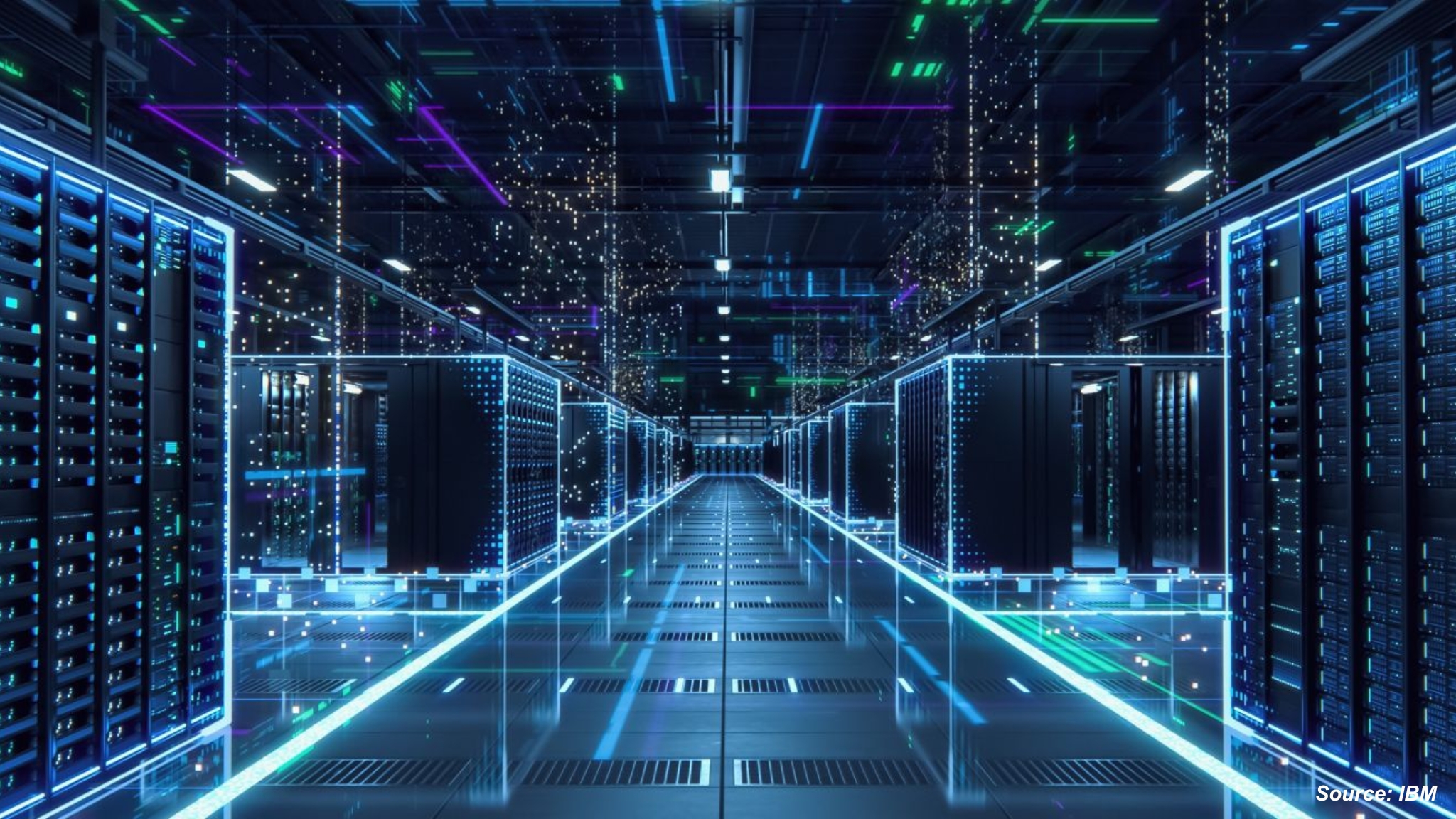What Are the Latest Trends in Data Centers?
Published: 2025-09-11

In today's digital age, data centers are the backbone of the expanding digital ecosystem. They facilitate critical functions ranging from cloud computing and edge computing to artificial intelligence (AI), the Internet of Things (IoT), and beyond. As technology evolves at an unprecedented rate, data centers need to continuously innovate to keep pace with the growing demands of the digital economy. According to Next Move Strategy Consulting, the data center market was valued at USD 214 billion in 2023, and is expected to reach USD 421 billion by 2030. Let's delve deeper into some of the latest trends and developments shaping the landscape of data centers and their growth in the coming years.
Edge Computing Revolution:
One of the most significant trends driving the evolution of data centers is the emergence of edge computing. Contrary to conventional centralized data processing approaches, edge computing relocates computational capabilities nearer to the data generation point. This enables real-time data processing and analysis. This paradigm shift is largely fuelled by the exponential growth of IoT devices, autonomous vehicles, and other latency-sensitive applications that demand instant access to computing resources at the network edge.
By decentralizing computing power, edge computing promises to revolutionize industries such as manufacturing, healthcare, and transportation by facilitating decision-making and optimizing resource utilization. In response to this trend, companies such as AWS collaborated with Siemens to develop solutions that seamlessly integrate industrial edge devices with cloud services. This collaboration is aimed at empowering businesses with enhanced connectivity and scalability for optimized operations and decision-making. This partnership underscores the importance of leveraging edge computing capabilities to drive innovation and improve operational efficiency in today's digital landscape.
Sustainable Data Centers:
Amid the growing concerns about environmental sustainability, there is an increasing emphasis on building energy-efficient and environmentally friendly data centers. As large consumers of energy, data centers are under pressure to reduce their carbon footprint and minimize environmental impact. To address this challenge, data center operators are adopting various strategies, including leveraging renewable energy sources such as solar and wind power.
Furthermore, they are implementing advanced cooling technologies to optimize energy efficiency and embracing innovative designs that maximize resource utilization and minimize waste. By prioritizing sustainability, data centers can reduce operating costs and contribute to broader efforts to combat climate change and preserve natural resources. Recent collaborations, such as the partnership between Infosys and Shell, further underscore the industry's commitment to sustainable practices in data center operations.
By leveraging renewable energy sources and innovative cooling technologies, these companies aim to minimize environmental impact and reduce carbon emissions. This will set a precedent for green initiatives within the data center industry. This proactive approach aligns with global efforts to tackle climate change and underscores the significance of sustainability in shaping the future of data center infrastructure.
Hybrid Cloud Adoption:
As organizations increasingly embrace cloud computing, there is a growing trend toward adopting hybrid cloud strategies that combine on-premise data centers with public cloud services. Hybrid cloud architectures offer flexibility to dynamically scale workloads while maintaining control over sensitive data and applications. This strategy enables organizations to utilize the scalability and cost-efficiency of public cloud services while maintaining the security and compliance advantages of on-premise infrastructure. Data centers are evolving to support hybrid cloud deployments by offering seamless integration between on-premise environments and public cloud platforms.
This factor enables organizations to optimize their IT resources and achieve agility in meeting evolving business needs. Lenovo expanded its hybrid cloud platform for AI with new ThinkAgile hyper-converged solutions and ThinkSystem servers, leveraging the next generation of Intel Xeon Scalable Processors. This AI-ready platform enhances performance and incorporates the latest accelerators, enabling a dynamic hybrid AI approach across public, private, and foundational models. As a result, organizations can democratize AI capabilities for all, leveraging the benefits of hybrid cloud architectures to drive innovation and achieve business objectives.
AI and Automation:
Artificial intelligence (AI) and automation are reshaping the landscape of data center operations. These technologies equip data centers with predictive maintenance, resource optimization, and intelligent workload management capabilities. AI-powered analytics tools empower data center operators to identify performance bottlenecks, predict equipment failures, and optimize energy efficiency. By leveraging machine learning algorithms, data centers can automate routine tasks, streamline operations, and reduce operational costs. This improves overall efficiency, reliability, and availability of critical IT infrastructure. This, in turn, ensures seamless service delivery to end users.
Recent collaborations such as the partnership between Qualcomm and Intel further exemplify the industry's shift toward decentralized AI processing. By moving AI workloads out of centralized data centers and into edge devices, these companies aim to meet the growing demand for AI processing closer to the source of data generation. This strategic move not only enables faster response times and reduced latency but also aligns with the broader trend of edge computing. This factor highlights the industry's commitment to innovation and adaptation in the digital era.
Security and Compliance:
As the volume and sensitivity of data stored in data centers grow, ensuring security and compliance remains a top priority for organizations. Data center operators invest in robust security measures such as encryption, access controls, and threat detection systems to safeguard against cyber threats and data breaches. The compliance with regulations such as the General Data Protection Regulation (GDPR) and the California Consumer Privacy Act (CCPA) drives investments in data center security and privacy to ensure compliance with stringent regulatory requirements.
By implementing comprehensive security frameworks and adopting industry best practices, data centers can mitigate risks and secure sensitive data from unauthorized access or disclosure. The increasing sophistication of cyber threats and the evolving regulatory landscape are prompting organizations to allocate more resources toward enhancing data center security. This trend ensures adherence to compliance standards and drives the upward trajectory in data center investment.
Modular and Containerized Data Centers:
Modular and containerized data centers offer a flexible and scalable approach to data center deployment. This approach enables organizations to rapidly deploy and expand their IT infrastructure to meet evolving business requirements. These prefabricated solutions are designed to be easily deployable in remote locations, edge environments, or temporary installations. They provide organizations with greater agility and flexibility in adapting to changing market conditions.
Modular data centers are particularly well-suited for edge computing deployments where space and power constraints may limit the feasibility of traditional data center construction. By leveraging modular and containerized data center solutions, organizations can accelerate time-to-market, reduce capital expenditures, and optimize resource utilization. These factors, in turn, drive greater efficiency and agility in their IT operations.
In conclusion, the data center industry is undergoing a period of rapid transformation, driven by advancements in technology, changing business needs, and evolving regulatory requirements. By embracing these latest trends and developments, data center operators can position themselves for success in the digital era. They will deliver reliable, efficient, and secure infrastructure to support the needs of modern enterprises.
About the Author
 Saurav Sarkar is an accomplished researcher and writer with over three years of experience in conducting thorough research. His passion for exploring various subjects and delving into in-depth analysis has led him to develop a keen understanding of research nuances. He remains committed to staying current with the latest market trends, recognizing their impact on businesses and society.
Saurav Sarkar is an accomplished researcher and writer with over three years of experience in conducting thorough research. His passion for exploring various subjects and delving into in-depth analysis has led him to develop a keen understanding of research nuances. He remains committed to staying current with the latest market trends, recognizing their impact on businesses and society.
About the Reviewer
 Sanyukta Deb is a seasoned Content Writer and Team Leader in Digital Marketing, known for her expertise in crafting online visibility strategies and navigating the dynamic digital landscape. With a flair for developing data-driven campaigns and producing compelling, audience-focused content, she helps brands elevate their presence and deepen user engagement. Beyond her professional endeavors, Sanyukta finds inspiration in creative projects and design pursuits.
Sanyukta Deb is a seasoned Content Writer and Team Leader in Digital Marketing, known for her expertise in crafting online visibility strategies and navigating the dynamic digital landscape. With a flair for developing data-driven campaigns and producing compelling, audience-focused content, she helps brands elevate their presence and deepen user engagement. Beyond her professional endeavors, Sanyukta finds inspiration in creative projects and design pursuits.
















Add Comment